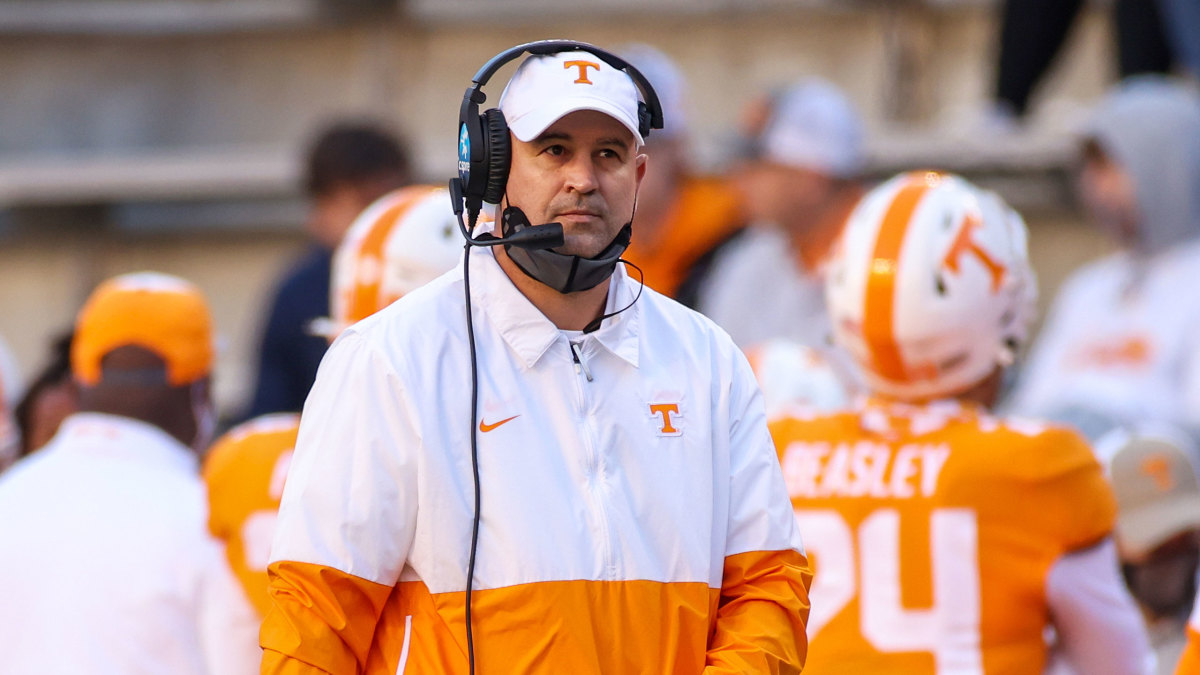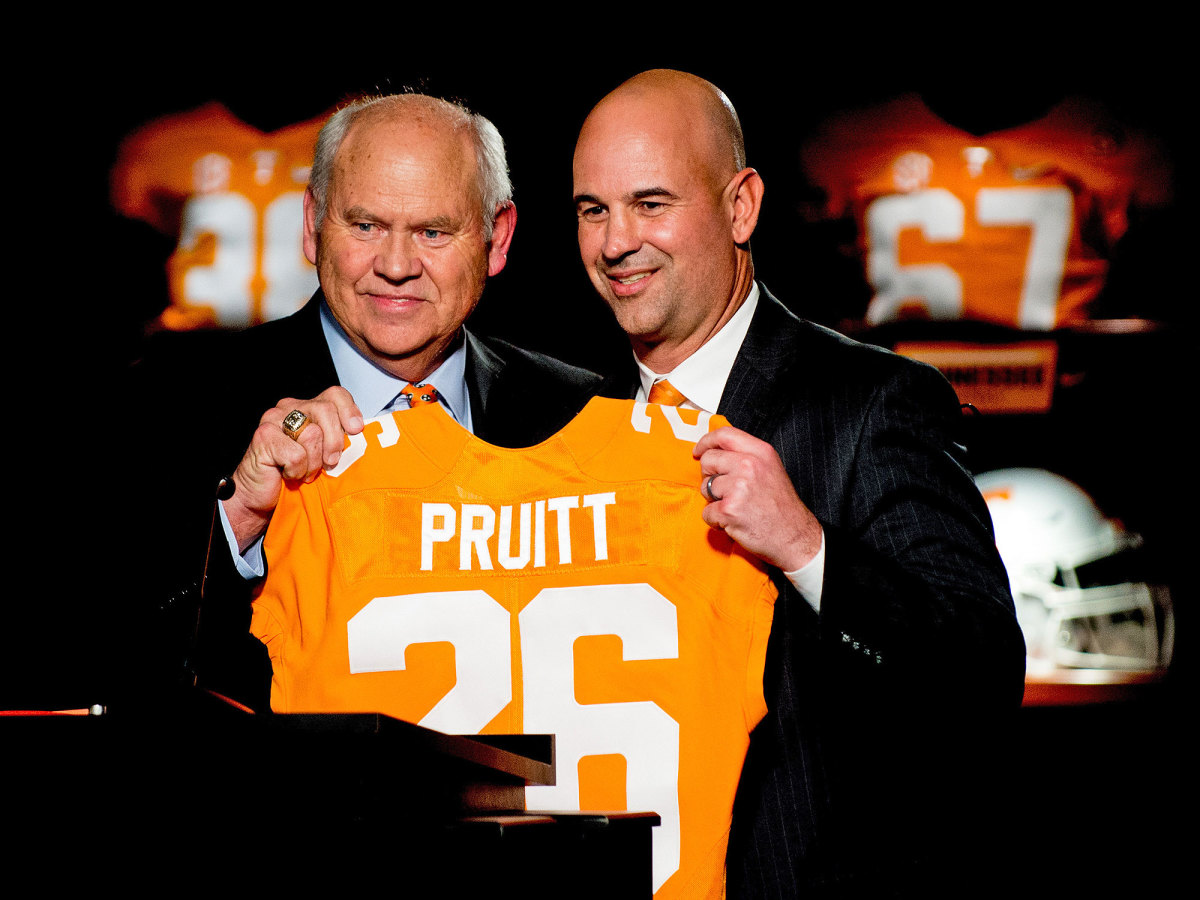Tennessee's Yield to Its 2017 Fan Revolt Comes to Embarrassing, Predictable Conclusion
Flush with revolutionary fervor, Tennessee fans were very busy congratulating themselves on Dec. 1, 2017.
On that day, former hero football coach Phillip Fulmer had been installed as athletic director after backstabbing John Currie out of the job. In the days leading up to that event, Volunteers fans incited by a barking media personality with a fanboy interest in the program had gone full vigilante to undercut Currie’s attempted hire of former (and future) Rutgers coach Greg Schiano. What ensued was a clown show that left Tennessee as the laughingstock of college athletics, but UT backers believed they had triumphed by putting administrative know-nothing Fulmer in charge of a search that eventually settled on the unproven Jeremy Pruitt.

Emails from Volunteers fans on Dec. 1, 2017:
“Tennessee fans got its (sic) program back. … Better days are ahead because a Tennessee man is in charge, and he isn't taking orders.”
“You should not underestimate, the power of good people taking the reigns (sic) of their own community. … Whatever the outcome may be, Tennesseans have every right to control their own future. For better or worse, Tennesseans will have a Tennesseean at the head of our college football program.”
Oh, it was for the worse. Much worse. A ridiculous, myopic, huckster-driven fan uprising has lurched to a predictable end: embarrassment, financial malpractice, alleged major NCAA violations, consistent losing … and, now, a total program reset that includes the Monday firing of Pruitt and nine staffers, plus the sudden retirement of Fulmer.
Good job, Vols. Good effort. You got your program back—whatever that means—and it’s a bigger dumpster fire than ever. You’ve surpassed even Auburn as the Dysfunction Capital of the Southeastern Conference. Maybe leave the radio guy’s opinions out of the coaching search this time. Maybe get an athletic director who knows how to do the job, instead of a comfort hire whose only qualification was being a beloved former coach.
Tennessee emerges from its revolutionary phase in sorrier shape than when it entered. Pruitt’s .457 winning percentage is the second-lowest in the past 114 years at the school among coaches who lasted more than one season. And now there is an NCAA scandal afoot.
Firing nine staffers plus the head coach indicates that the alleged violations—termed “stunning” by chancellor Donde Plowman—are widespread. (Plowman said the allegations are expected to be Level I and II, which could expose the program to postseason bans and scholarship reductions, among other penalties.) December signees should be released from their national letters of intent, and getting anyone to sign in February could be difficult. The 11-year slog through irrelevance is destined to continue.
University of Tennessee system president Randy Boyd said more than once Monday, “If you can’t win with integrity, we don’t want you here.” But the administrative hand-wringing has a deeply cynical undertone to it—would the school be taking these forceful steps if Pruitt were winning? And did it take the unusual (by modern standards) step of aggressively self-investigating this case as a means to avoid paying Pruitt’s eight-figure buyout?
Getting rid of a bad coach is increasingly expensive in college football, and Tennessee made sure to be part of that trend when Fulmer gave Pruitt an unjustified preseason contract extension and raise. At that point, Pruitt’s record was 13–12. He was 0–6 and uncompetitive against the Vols’ three main rivals: Florida, Georgia and Alabama. He had losses to Missouri by 33 and Vanderbilt by 25 on the ledger. There was a second-year loss to Georgia State as well. But a string of victories over lightweight competition to end the 2019 season led Fulmer to extend Pruitt, despite the fact that there was no tangible market for him to be hired anywhere else.
(Shortly thereafter, news of another dubious contract came out—Fulmer himself signed a two-year extension through 2023, which included a six-figure retention bonus. Of all the people in sports administration in America, Phillip Fulmer wasn’t going anywhere. Nobody else would hire him to be an AD. And here was Tennessee giving him retention bonuses for a job he was never suited to have to begin with.)
So because the Vols hired a bad football coach and made it fiscally prohibitive to fire him for losing, they needed a key to unlock their golden handcuffs. Here it came, on Nov. 13, according to the school: information about NCAA violations that could allow the school to fire Pruitt for cause. (Interesting timing. That was six days after Tennessee’s worst loss of the year, by 11 points to Arkansas, midway through a 3–7 season.)
Here in the third decade of the 21st century, schools usually have two responses to potential NCAA scandals: look the other way and pretend not to notice, or circle the wagons and fight like hell. Tennessee opted to aggressively self-investigate, which is telling.
“His firing was for cause,” Plowman said Monday. “Which means no buyout.” Pruitt’s lawyers likely will have something to say about that. This contractual taffy pull seems a long way from over.
Tennessee’s first search will be to replace Fulmer, then Pruitt. (The interim coach is Kevin Steele, who was nearly elevated to head coach at Auburn after a booster coup ousted Gus Malzahn—the administration balked and hired Bryan Harsin from Boise State instead. Anyway, Steele is no stranger to drama.) Plowman noted that she wanted a new AD who has “experience in hiring coaches.” Seems like a good idea.
That was the only shade cast Fulmer’s way at a press conference that turned into a fawning goodbye party for a guy who flunked the one big task he had. But such is Fulmer’s hold upon all things Tennessee. That 1998 national title only looms larger given the current football malaise.

Fulmer’s failure to read the room and understand the moment was clear when he was asked about Pruitt’s legacy on the job. His halting answer: “We found the program in quite a mess at the time. I think we definitely have upgraded the program in general. … The recruiting has been—has been good. There were definitely lots of good things that have happened.”
Um, the recruiting is why Tennessee fired all those people Monday. That and the losing. Jeremy Pruitt went 16–19 in his 35 games on Rocky Top; Butch Jones, the guy they fired to hire Pruitt, went 22–13 in his final 35 games.
A sizable portion of the Volunteers fan base will clamor for Hugh Freeze to ride in from Liberty as the next program savior. From the tone of the Tennessee press conference, that is a non-starter—you can’t fire a coach for NCAA violations and then hire a guy whose last SEC job ended with his program serving a two-year postseason ban.
And, here’s a thought: this time around, don’t let the fans dictate the coaching search. The embarrassment from the last time Tennessee went that route is still reverberating. “Taking back their program” meant crashing the thing into a ditch.
